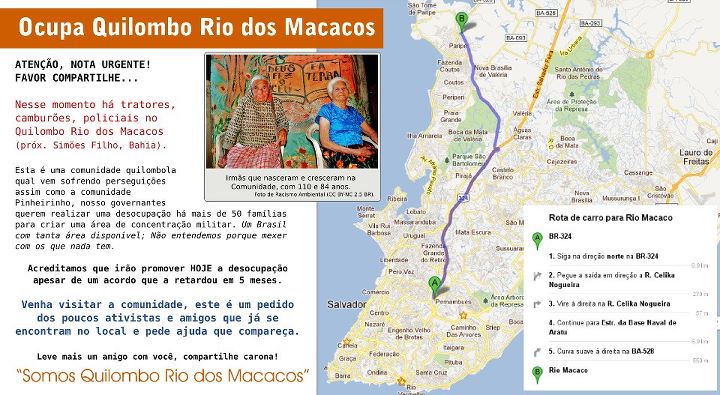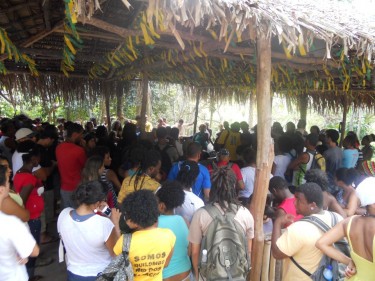Quilombo Rio de Macacos in Bahia, one of the oldest communities of descendents of slaves in Brazil, woke up enclosed by military police threatening their eviction on Sunday morning, March 4, 2012.
The Brazilian Navy hold an order for repossession of the lands on which 50 families live, as Global Voices reported on February 21. However, it was guaranteed in a hearing with the Brazilian federal government on February 27 that the eviction would be suspended for five months [pt] until the conclusion of a Technical Identification and Delimitation Report from the National Institute of Colonisation and Agrarian Reform (Incra).
“Article 68 in the 1998 Constitution and the Decree 4887/2003 guarantee the rights of the community's centuries-long occupation,” explains sociologist and president of the Development Council of the Black Community in Bahia, Villma Reis, one of the first persons to react [pt] publicly on March 4 after the siege by the police:
Marcada para a hoje, 04.03.2012, e suspensa por ação da Presidência da Republica (Secretaria Geral, SEPPIR [Secretaria de Políticas de Promoção da Igualdade Racial] e FCP [Fundação Cultural Palmares]), a tomada do Território do Quilombo Rio dos Macacos está neste momento vivendo uma grande tensão, pois neste momento já tem mais de 03 caminhões de fuzilheiros dentro da Comunidade, cada um com cerca de 80 homens, do lado de fora tem os militares da Bahia (que não podem entrar) e 01 trator posicionado no portão da Vila Naval, área tomada da comunidade há 42 anos atrás.
The Ondina settlement of the Occupy Salvador movement rapidly created an event [pt] on Facebook after receiving requests for help from two local activists. A call for a solidarity “occupation” of the quilombo was soon made. A map showing how to get to the community was shared, and more information was uploaded throughout the day.
“The sense of solidarity with the people of Quilombo do Rio dos Macacos was fundamental in order for the Navy to retreat and withdraw their trucks, marines and the tractor from the area of Quilombo,” announced [pt] the Bahia blog network.
The blog also republished the testimony of one activist who responded to the call and spent the day in the community along with around 300 other individuals, including representatives of various organizations, activists from the black people’s movement, university students and school kids.
Poliana Rebouças, described the following events:
A mobilização começou com uma visita solidária feita por alguns grupos para levar alimentos para a comunidade, que esteve impedida pela marinha de pescar e plantar no local durante o período de ameaça de desocupação anteriormente. Ao chegar lá, este grupo encontrou tratores, policiais militares armados, além de camburões, o que indicava mais uma ameaça de desocupação. Os moradores relataram que foram ameaçados durante a madrugada e houve tiros e intimidações, através de pressão psicológica.
A marinha impediu todo o grupo de entrar no quilombo, o que fez com que a maioria tivesse de entrar pelos fundos e depois tirar uma comissão para entrar no quilombo e levar a alimentação e checar a situação dos moradores. No início da tarde, a situação estava sob controle, contatos foram feitos com representantes do ministério da defesa que garantiram que não haverá desocupação em 5 meses, prazo dado aos moradores para que comprovem que são remanescentes de quilombo originário naquela região.
The same blog shared testimony by an anonymous naval officer who said that “the troop’s presence there was a coincidence and a routine operation.”
Journalist Daniela Novais, from the site Câmara em Pauta, reaffirmed the guarantee promised by the Federal Government “that the community’s rights would be preserved”, adding [pt]:
A corporação [Marinha do Brasil] ainda não se pronunciou e se limitou a informar que enviaria nota através da assessoria de comunicação da corporação militar, quando tiver autorização para tal. Nós do Câmara em Pauta esperamos que o governo da Bahia interfira energicamente a fim de não repetir o episódio de violação de direitos humanos na reintegração de posse de Pinheirinho, em São José dos Campos, São Paulo.
Like Novais, who considered that “Quilombo Rio dos Macacos lived a Pinheirinho day” [pt] several other internet users mentioned [pt] the repossession of Pinheirinho that took place on January 22 under excessive police force, as reported by Global Voices.
In regards to the community’s safety, a note was republished [pt] by Sandra Martuscelli (@PersonalEscrito) on Twitter reflecting the fear shared by many:
ninguém sabe o que pode acontecer depois que esse coletivo for desmobilizado, não há segurança em relação ao que vai acontecer hoje à noite, amanhã, durante a semana…
A petition for the preservation of possession and title of the lands of Quilombo do Rio dos Macacos [pt] has been circulating. It recalls the quilombola community’s rights enshrined in the constitution, while reinforcing the claim for “the “demarcation, titling and ownership of the lands occupied by descendents of the quilombola people, allowing the continuity of these communities, which should be considered as the greatest proof of a symbol of the struggle against slavery, in the past, and racism, in the present”.









2 comments